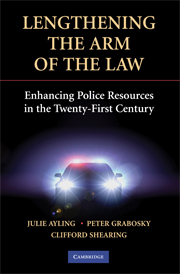5 - Sale – Selling
Published online by Cambridge University Press: 05 June 2012
Summary
Police also engage in the act of selling their own goods and services in order to bring in financial resources to the police organisation. In this chapter we consider, in Part 1, police selling their services, what is sometimes called ‘user-pays’ or ‘fee-for-service’ policing. Part 2 looks at the sale by police of the police ‘brand’ in the form of merchandise and intellectual property.
PART 1: POLICE AS COMMERCIAL SECURITY VENDORS
Police are not only purchasers but also vendors of security. A market in crime control is far from new, as is made clear in histories of state police (Radzinowicz 1956b; Critchley 1972), but, as Zedner points out, the scale is changing. Today's market reaches all corners of the globe rather than being constrained by local or national borders (Zedner 2006: 83–84). This market includes state and non-state providers of security that are engaged in both domestic policing and military activities (Singer 2003, 2005; Avant 2005, 2006). In exploring this market, the principal research focus has been on the activities of private security companies. Much less attention has been devoted to the activities of state police organisations as players within the market (for exceptions, see Reiss 1988, Blair 1998; Wood 2000; Johnston 2003; Crawford and Lister 2006; Johnston 2006). What is particularly significant about the police as commercial security vendors is that, when their services are paid for by non-state entities, the police retain their legal status and the access this provides to the legitimate use of physical, including deadly, force (Stenning and Shearing 1979; Law Commission of Canada 2006).
- Type
- Chapter
- Information
- Lengthening the Arm of the LawEnhancing Police Resources in the Twenty-First Century, pp. 133 - 167Publisher: Cambridge University PressPrint publication year: 2008



